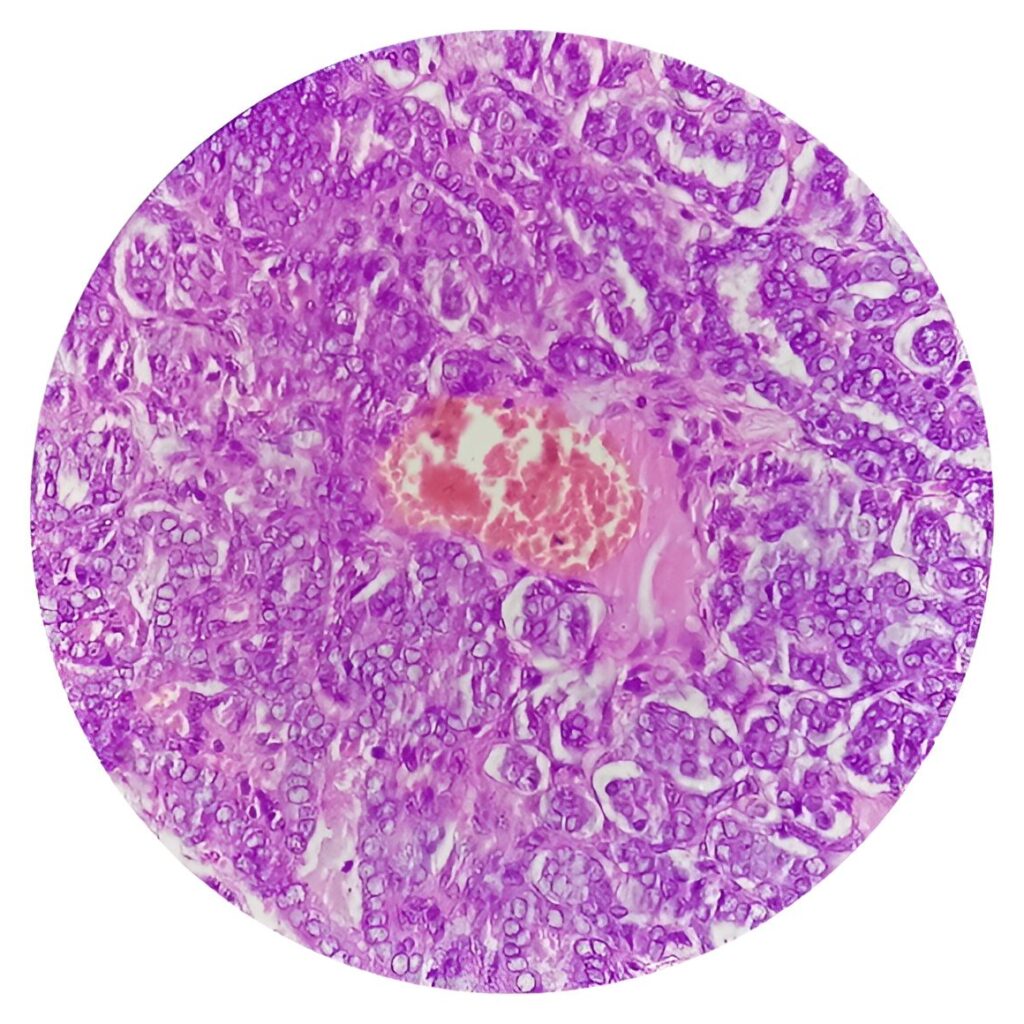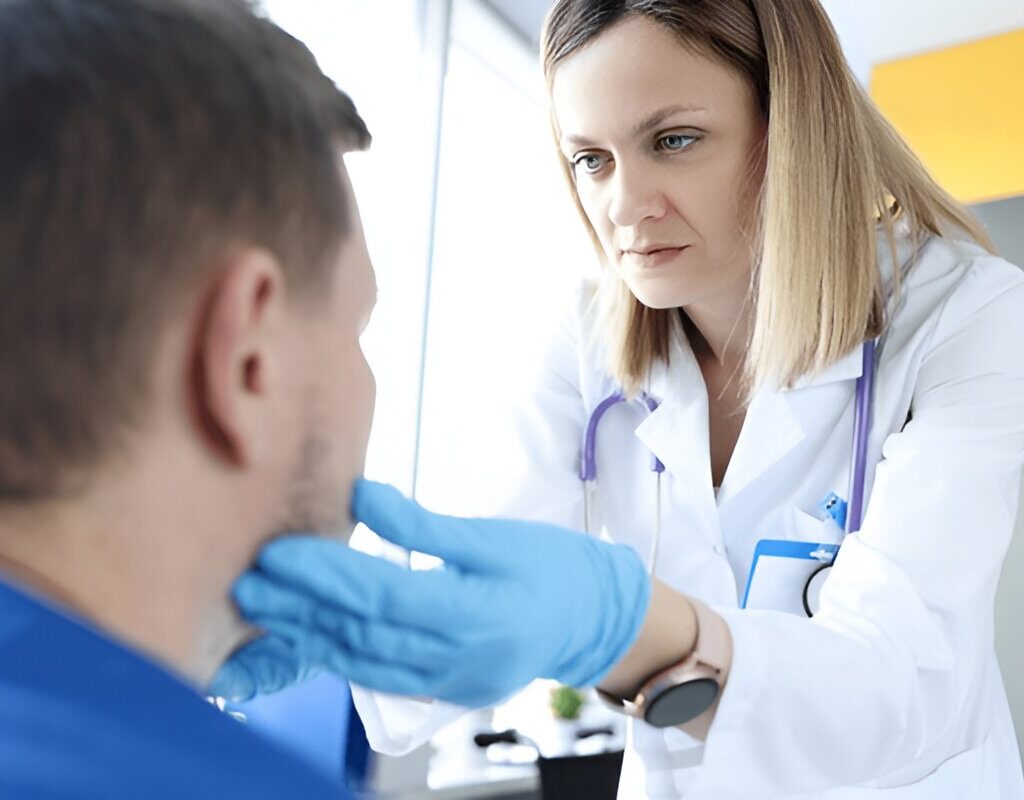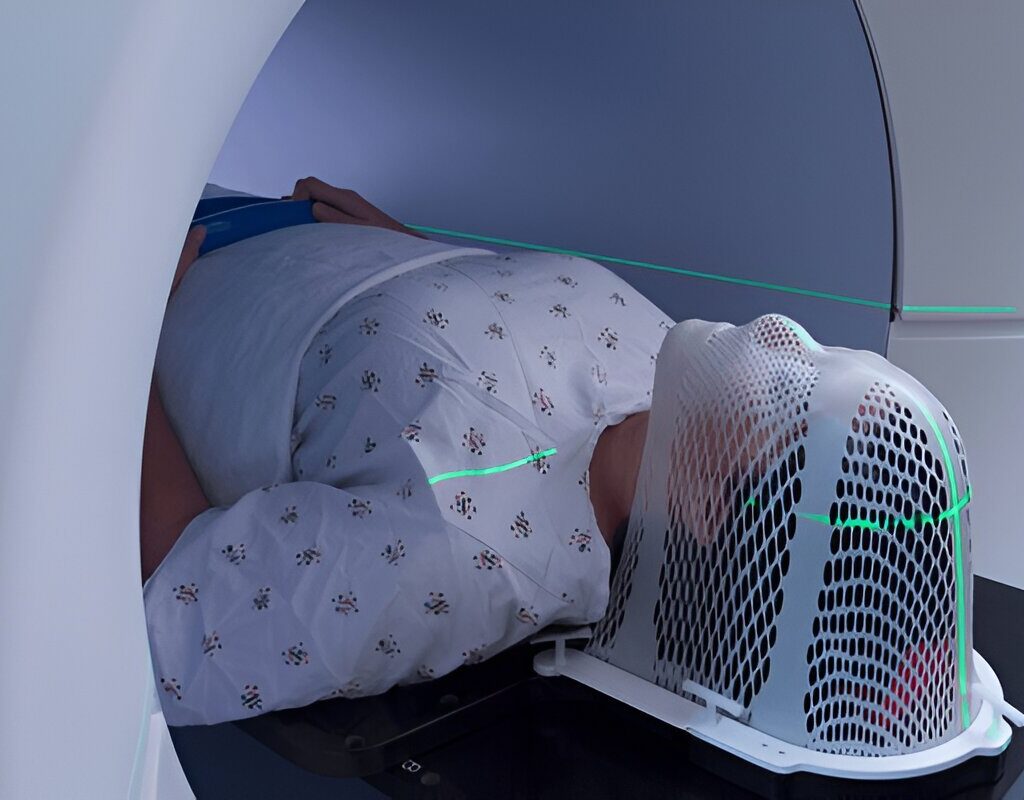Excellent Head and Neck Cancer Treatment in Georgia
At CurePoint Cancer Center, we specialize in providing best head and neck cancer care in Georgia, helping patients receive accurate diagnoses, advanced treatments, and compassionate support throughout their journey. Whether you’re seeking early diagnosis or exploring advanced treatment options, our ENT cancer specialists in Georgia are here to guide you every step of the way.

What is Head and Neck Cancer?
Head and neck cancer develops the tumors in the mouth, throat, nose, sinuses, voice box, and salivary glands throughout the upper aerodigestive tract. These tumors most often grow in the top breathing system parts where they block vital breathing and speech functions and interfere with swallowing.
Head and neck squamous cell carcinoma emerges as the primary cancer type and starts from the cells covering the head and neck regions. Accurate disease detection followed by appropriate medical help enhance both the chances of recovery and patient health benefits.
It is a disease in which cells of the body grow out of control. Cancers of the head and neck include cancers that start in several places in the head and throat, not including brain cancers or cancers of the eye.
These cancers can start—
- In the sinuses (the spaces around the nose on the inside of the skull).
- Inside and behind the nose.
- In the mouth, including the tongue, the gums, and the roof of the mouth.
- In the back of the mouth and the throat (pharynx), which includes three sections called the nasopharynx, oropharynx, and hypopharynx.
- In the larynx (voice box).
- On the lips, although cancer on the lips is a type of skin cancer.
- In the glands that make saliva for the mouth, but those are relatively rare.
Types of Head and Neck Cancer
This cancer groups depend on their starting location for classification:
- Oral Cavity Cancer (mouth, lips, tongue)
- Pharynx Cancer (nasopharynx, oropharynx, hypopharynx)
- Laryngeal Cancer (voice box)
- Salivary Gland Cancer
- Nasal Cavity and Paranasal Sinus Cancer
- Oropharyngeal Cancer
- Nasopharyngeal Cancer
- Hypopharyngeal Cancer
Each type requires a personalized treatment approach, and our head and neck cancer center of excellence in Georgia ensures patients receive proper care.

Signs and Symptoms:
Early detection of head and neck cancer symptoms can lead to quicker treatment and improved recovery. The particular tumor site determines which symptoms will develop from this cancer but they usually involve blocks in breathing, swallowing, or talking.
Common Symptoms (General)
- Persistent sore throat
- Pain or difficulty swallowing
- Lumps or swelling in the neck or mouth
- Hoarseness or changes in voice
- Unexplained weight loss
- Painful sores or ulcers in the mouth that do not heal
- Bleeding or numbness in the mouth or throat
- Ear pain
Gender-Specific Symptoms
Symptoms in Men
- Long-lasting snoring plus blocked breathing through the nose
- Frequent nosebleeds
- Swollen lymph nodes in the neck
- Changes in facial appearance
Symptoms in Women
- Sore throat with persistent hoarseness
- Mouth ulcers that don’t heal
- Jaw stiffness or pain
- Neck stiffness and tenderness
If you experience early-stage neck pain symptoms or symptoms of neck cancer in lymph nodes, we recommend seeking medical attention immediately.
Causes of Head and Neck Cancer in Men and Women
Common Causes
- Regular tobacco products both as smoked and chewed forms cause oral cancer.
- Alcohol consumption
- Human papillomavirus (HPV) infection
- Epstein-Barr virus (EBV)
- Exposure to certain industrial chemicals or asbestos
Gender-Specific Causes
In Men:
- Higher tobacco and alcohol use
- Occupational hazards (chemical exposure)
- Poor oral hygiene
In Women:
- HPV-related oral infections
- Hormonal imbalances
- People get oral cancer when they use cosmetics made from dangerous substances
Diagnosis and Specifications for Testing Cancer
Through advanced diagnostic procedures CurePoint scans for cancer while it remains at its initial stage. The initial examination of ENT cancer patients involves physical inspection to determine standard diagnostic procedures.
Diagnostic Tests Include:
- Endoscopy: Special tools view throat and nasal passages during testing.
- Imaging Tests: Medical Picture Tests Include CT Scans MRI Ranges PET Scans and Plain X-Rays.
- Biopsy: We perform a tissue examination to ensure the patient has cancer.
- Blood Tests: Doctors review complete blood test results to see both general health status and possible cancer indications.
- HPV & EBV Testing: Especially in pharyngeal and nasopharyngeal cancers.
Our center is recognized among the best neck and head cancer treatment centers in Georgia, offering thorough diagnosis and patient-centered treatment plans.


Head and Neck Cancer Treatments
We offer comprehensive cancer treatments in Georgia, using the latest medical advancements to improve outcomes.
- Surgery:
The medical team performs tumor removal operations keeping both normal functions and facial shape intact.
- Radiation Therapy:
High-energy rays to destroy cancer cells.
- Chemotherapy:
Drugs used to destroy cancer cells and prevent their growth. Our specialists follow proper chemotherapy regimens tailored to your condition.
Common Chemotherapy Side Effects:
- Fatigue
- Hair loss
- Nausea
- Reduced immunity
We provide holistic care and support to help ease the side effects of chemotherapy for laryngeal cancer.
- Targeted Therapy:
Focuses on specific cancer cell genes or proteins.
- Immunotherapy:
The body gains enhanced power to defend itself against cancer cells naturally.
Our ENT treatment guidelines align with NCCN (National Comprehensive Cancer Network) and head and neck cancer treatment guidelines NSSN, ensuring standardized, evidence-based care.
Precautions and Aftercare:
Recovery doesn’t end after treatment. We emphasize precautions after head & neck cancer treatments to reduce recurrence risks and promote healing.
Key Precautions:
- Quit smoking and alcohol completely
- Maintain good oral hygiene
- Attend regular follow-ups and screenings
- Choose meals that blend nutrients in soft foods to eat.
- Wear protection supplies when working near risky conditions
- Regular check-ups, as the healthcare team treats mouth dryness and swallowing problems through medical therapy.
These precautions on head & neck cancer can significantly increase survival chances and improve life quality post-treatment.
Frequently Asked Question's
If it is left without treatment, neck cancer becomes a threat to life. We improve neck cancer survival rates through early diagnosis and cutting-edge care.
Oral cavity cancer and laryngeal cancer are the most common, especially among tobacco users.
Different types of Necks tumors require classification from C00-C14 for Oral Cavity and Pharynx cancer to C32 for Larynx tumors.
Why Choose CurePoint for Head and Neck Cancer Care in Georgia?
Our treatment center ranks among the finest head and neck tumors treatment facilities offering high-quality services.
✅ Expert Oncologists & ENT Surgeons
✅ Advanced Diagnostics & Imaging
✅ Personalized Chemotherapy Plans
✅ Holistic Palliative Care
✅International Treatment Protocols
✅Supportive Post-Treatment Programs
Searching for a head and neck cancer center near you? CurePoint Cancer Center in Georgia acts as your reliable provider of healing for cancer-related recovery.
Book an Appointment with ENT Specialists in Georgia .
Contact ENT cancer care experts without delay when you or loved ones display above symptoms. Reach out to the best head and neck tumor care in Georgia today. Our team offers top-ranked oncology healthcare with passionate patient care and uses advanced knowledge to give hope to those we treat.
📍 Visit our Head and Neck Cancer Center of Excellence in Georgia
Book your medical consultation here: 🌐https://curepointcancer.com/contact/
CurePoint Cancer Center – Your Partner in the Fight Against Head and Neck Cancer in Georgia
What Are the Symptoms of Head and Neck Cancers?
What Are the Symptoms of Head and Neck Cancers?
What Causes Head and Neck Cancers?
Alcohol and tobacco are major risk factors for cancers of the head and neck. All tobacco products, including cigarettes, cigars, pipes, and smokeless tobacco (chewing tobacco, snuff, or a type of chewing tobacco called betel quid) are linked to head and neck cancer (except for salivary gland cancers). Drinking any type of alcohol, such as beer, wine, or liquor, also raises the risk of getting cancers of the mouth, throat, and voice box.
About 70% of cancers in the oropharynx (which includes the tonsils, soft palate, and base of the tongue) are linked to human papillomavirus (HPV), a common sexually transmitted virus.
Overexposure to ultraviolet (UV) rays from the sun, tanning beds, or sunlamps is a cause of cancer on the lips.
Occupational exposures, or being exposed to certain substances while on the job, can increase the risk of getting cancers in the nasopharynx. Working in the construction, textile, ceramic, logging, and food processing industries can cause people to be exposed to substances like wood dust, formaldehyde, asbestos, nickel, and other chemicals.
An infection with the Epstein-Barr virus, a cause of infectious mononucleosis and other illnesses, can raise the risk of cancers in the nose, behind the nose, and cancers of the salivary glands.
Radiation treatments to the head and neck can cause head and neck cancers.
About twice as many men as women get head and neck cancers. They are more likely to be diagnosed in people who are over 50 years of age.
Lewis’ Story: Throat Cancer Changed His World
After Lewis was diagnosed with throat cancer, he and his wife Amy started a support group for people with head and neck cancers. Read his story.
How Can I Reduce My Risk for Head and Neck Cancers?
You can lower your risk of getting head and neck cancer in several ways—
- Don’t smoke. If you smoke, quit. Quitting smoking lowers the risk for cancer.
- Don’t use smokeless tobacco products.
- Limit the amount of alcohol you drink.
- Talk to your doctor about HPV vaccination. The HPV vaccine can prevent new infections with the types of HPV that most often cause oropharyngeal and other cancers. Vaccination is recommended only for people at certain ages.
- Use condoms and dental dams consistently and correctly during oral sex to lower the chances of giving or getting HPV.
- Use lip balm that contains sunscreen, wear a wide-brimmed hat when outdoors, and avoid tanning.
- Visit the dentist regularly. Checkups often can find head and neck cancers early, when they are easier to treat.
